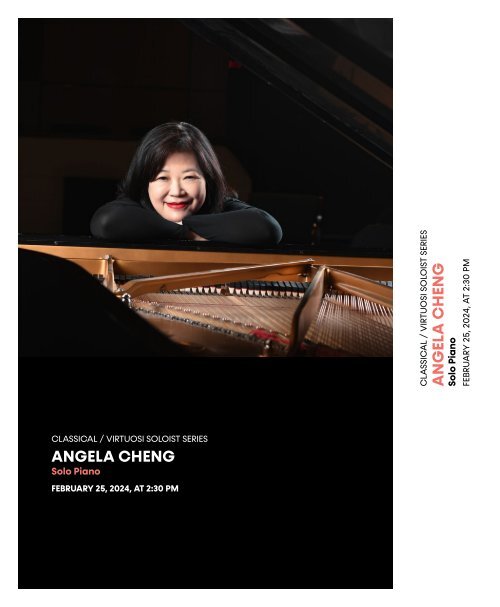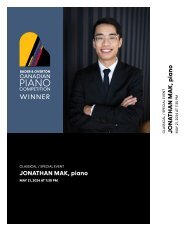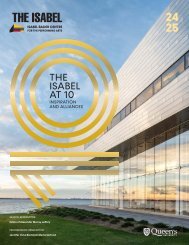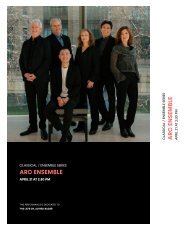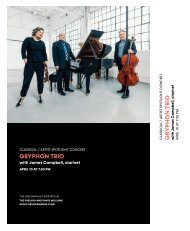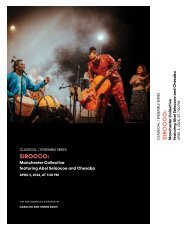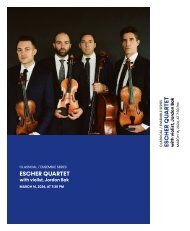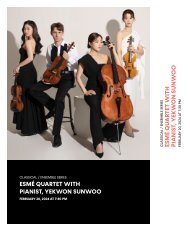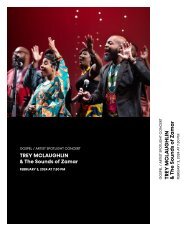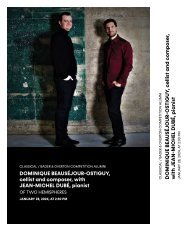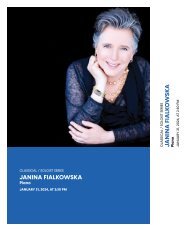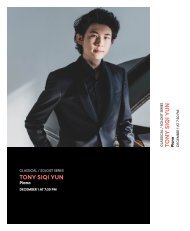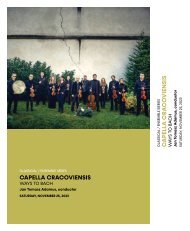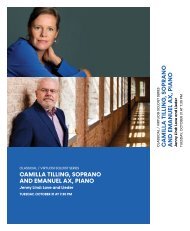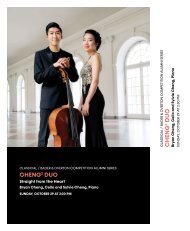Create successful ePaper yourself
Turn your PDF publications into a flip-book with our unique Google optimized e-Paper software.
CLASSICAL / VIRTUOSI SOLOIST SERIES<br />
ANGELA CHENG<br />
Solo Piano<br />
FEBRUARY <strong>25</strong>, <strong>2024</strong>, AT 2:30 PM<br />
CLASSICAL / VIRTUOSI SOLOIST SERIES<br />
ANGELA CHENG<br />
Solo Piano<br />
FEBRUARY <strong>25</strong>, <strong>2024</strong>, AT 2:30 PM
CLASSICAL / VIRTUOSI SOLOIST SERIES<br />
ANGELA CHENG<br />
Solo Piano<br />
PROGRAM<br />
HAYDN<br />
Piano Sonata in C Major, Hob. XVI/50<br />
Allegro<br />
Adagio<br />
Allegro molto<br />
MOZART Piano Sonata No. 10 in C Major, K. 330<br />
Allegro moderato<br />
Andante cantabile<br />
Allegretto<br />
BEETHOVEN Piano Sonata No. 31 in A Flat Major, Op. 110<br />
Moderato cantabile molto espressivo<br />
Allegro molto<br />
Adagio ma non troppo – Fuga: Allegro ma non troppo<br />
INTERMISSION<br />
CHOPIN Nocturne in D Flat Major, Op.27, No. 2<br />
Polonaise-Fantasie in A Flat Major, Op. 61<br />
Ballade No. 1 in G Minor, Op. 23<br />
Ballade No. 4 in F Minor, Op. 52
PROGRAM NOTES<br />
The career of Viennese composer Franz Joseph<br />
Haydn (1732-1809) coincided with a musical shift in<br />
tastes, as the monothematic instrumental music of<br />
the late Baroque evolved into the classical sonata<br />
with its emphasis on contrasting melodic ideas<br />
contained within a single movement. Recognizing<br />
Haydn’s originality and models, both Wolfgang<br />
Amadeus Mozart (1756-1791) and Ludwig van<br />
Beethoven (1770-1827) were known<br />
to remark on their indebtedness to Haydn.<br />
The Haydn sonata opening this concert was likely<br />
the last one Haydn composed and dates from<br />
1794. A confidently mature work, it displays a<br />
resourceful economy of motivic material. This can<br />
be heard in the way the opening three notes are<br />
continually isolated and reinterpreted, as well as in<br />
the compactness of the final movement’s sparkling<br />
rondo that races to the finish line in under three<br />
minutes.<br />
Mozart’s sonata in the same key was composed<br />
a decade earlier than the Haydn and is built<br />
more prominently around longer melodic lines<br />
in the right hand, usually supported by brokenchord<br />
figuration in the left. Of note, is the slow<br />
movement’s digression to a very sombre F minor<br />
that continually stresses a throbbing repeated-note<br />
pedal point.<br />
Ludwig van Beethoven’s earliest <strong>piano</strong> sonatas<br />
date from 1795, and of the 32 he composed,<br />
only Op. 110 is in A flat major. This work has an<br />
intensely dramatic focus, prominently heard in<br />
the third movement’s expressive recitative-like<br />
passages that lead into a Bach-like fugue based<br />
on a subject of rising perfect fourth intervals. This<br />
fugue subject reveals the organic nature of the<br />
entire work as its pitches follow the main notes of<br />
the opening movement’s gentle theme. The brevity<br />
of the second movement’s F minor Scherzo, and<br />
the way it abruptly ends with an arpeggiated F<br />
Major chord that resolves into the slow movement,<br />
also suggest that Beethoven viewed this work as<br />
one continuous overarching structure. The last<br />
movement’s reworking of the slow movement’s<br />
recitative-like theme after the initial fugue, is<br />
always an astounding moment, especially given<br />
the way it sets up an entirely new fugal section<br />
and coda, all based on the fugue subject turned<br />
upside down and employed in combination with<br />
the original version.<br />
Frédéric Chopin (1810-1849) composed almost<br />
exclusively for the <strong>piano</strong> and his own performance<br />
opportunities, although he preferred playing in<br />
the more intimate settings of a Paris salon than on<br />
the concert stage. In genres such as the Nocturne<br />
and Polonaise, Chpoin’s operatic-like approach<br />
to melodic ornamentation and the incorporation<br />
of Polish dance elements, lend his music a<br />
distinctiveness that is often quite recognizable. The<br />
Polonaise-Fantasie is a late work and, from the very<br />
first page with its surprising harmonic shifts and<br />
slow cadenza-like exploration of the keyboard, it is<br />
apparent that the fantasy element will be a primary<br />
compositional motivator. As will also be heard in<br />
the two Ballades, it is in the transitions joining two<br />
sections together, where Chopin is often his most<br />
creative, either harmonically or virtuosically (or<br />
both). These moments provide the music with a<br />
forceful sense of momentum that in all three works,<br />
reaches its peak towards the music’s conclusion.<br />
©<strong>2024</strong> by John Burge for the Isabel<br />
ABOUT ANGELA CHENG<br />
Consistently praised for her brilliant technique,<br />
tonal beauty, and superb musicianship, Canadian<br />
pianist <strong>Angela</strong> <strong>Cheng</strong> is one of her country’s<br />
national treasures. In addition to regular guest<br />
appearances with virtually every orchestra in<br />
Canada, she has performed with the symphonies<br />
of Saint Louis, Houston, Indianapolis, Colorado,<br />
Utah, San Diego and Jacksonville, as well as the<br />
philharmonic orchestras of Buffalo, Louisiana,<br />
Rhode Island, London, Israel and Minas Gerais<br />
in Brazil.<br />
Recent performances include a debut with the<br />
Fort Worth Symphony, performing Rachmaninoff’s<br />
“Variations on a Theme of Paganini,” under the<br />
baton of Robert Spano, and a return to the<br />
Vancouver Symphony, performing Ravel’s Concerto<br />
in G with Otto Tausk. Next season will include the<br />
Boulder Philharmonic, Newfoundland Symphony,<br />
Okanagan Symphony, Saskatoon Symphony,
Saguenay Symphony and the Symphony of<br />
Northwest Arkansas.<br />
<strong>Angela</strong> <strong>Cheng</strong> has performed recitals and<br />
concertos at Carnegie Hall, Kennedy Center<br />
in Washington, D.C., the 92nd Street Y in New<br />
York, and Wigmore Hall in London. She appears<br />
regularly on recital series throughout the United<br />
States and Canada and has collaborated with<br />
numerous chamber ensembles including the<br />
Takács, Colorado, and Vogler quartets. North<br />
American festival performances include Banff,<br />
Chautauqua, Colorado, Great Lakes Chamber<br />
Music, Vancouver, Toronto, and the Festival<br />
International de Lanaudière in Quebec.<br />
Ms. <strong>Cheng</strong> has made several recordings for CBC,<br />
including discs of Mozart and Shostakovich<br />
concerti and a CD of four Spanish concerti with<br />
Hans Graf and the Calgary Philharmonic. In<br />
addition, an all Chopin recital CD has been<br />
released by Universal Music Canada.<br />
<strong>Angela</strong> <strong>Cheng</strong> has been Gold Medalist of the<br />
Arthur Rubinstein International Piano Masters<br />
Competition, as well as the first Canadian to<br />
win the prestigious Montreal International Piano<br />
Competition. Other awards include the Canada<br />
Council’s coveted Career Development Grant<br />
and the Medal of Excellence for outstanding<br />
interpretations of Mozart from the Mozarteum<br />
in Salzburg, Austria.<br />
A native of Hong Kong, Ms. <strong>Cheng</strong> studied<br />
extensively with Menahem Pressler at Indiana<br />
University and with Sascha Gorodnitzki at The<br />
Juilliard School. She is currently on the artist<br />
faculty of the Oberlin Conservatory of Music,<br />
where she was honored with the 2011-12<br />
Excellence in Teaching Award. •<br />
SPECIAL<br />
EVENT!<br />
BADER & OVERTON CANADIAN<br />
PIANO COMPETITION WINNER<br />
Jonathan<br />
Mak, <strong>piano</strong><br />
CLASSICAL / SOLOIST<br />
Tues, May 21, <strong>2024</strong> at 7:30pm<br />
Winner of the 2023 inaugural Bader &<br />
Overton Canadian Piano Competition and<br />
one of CBC’s 30 hot Canadian classical<br />
musicians under 30, Jonathan Mak has<br />
already made his mark on the world<br />
stage as a guest soloist with numerous<br />
orchestras. Mak will take the Isabel stage<br />
performing a program of repertoire by<br />
Bach, Schumann, and Prokofiev.<br />
TICKETS: General Public $30+ / Faculty/Staff $27+ / Student $10<br />
queensu.ca/theisabel


